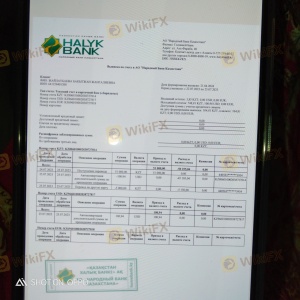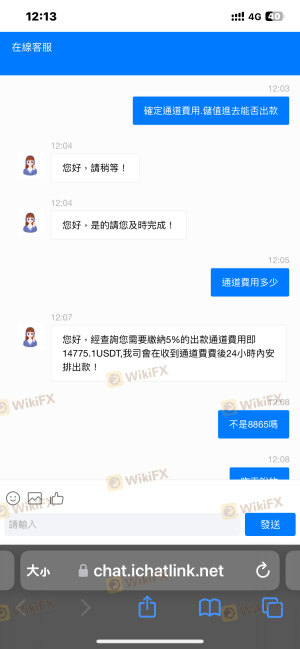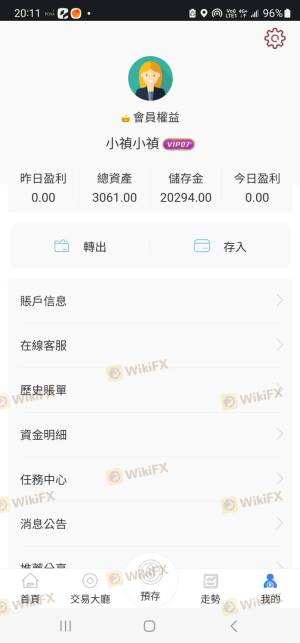Is AMUNDI safe?

Pros
Cons
Is Amundi A Scam?
Introduction
Amundi is a relatively new player in the forex market, established in 2021 and based in China. As a brokerage firm, it aims to provide trading services to both retail and institutional clients. However, the rapid expansion of online trading platforms has also led to an increase in fraudulent schemes, making it crucial for traders to carefully evaluate the legitimacy and reliability of brokers. This article aims to investigate the safety of Amundi by examining its regulatory status, company background, trading conditions, customer experiences, and overall risk profile. Our assessment is based on a thorough review of multiple sources, including user testimonials, regulatory databases, and industry reports.
Regulation and Legitimacy
Regulatory oversight is a critical factor in evaluating the credibility of any brokerage firm. Amundi currently lacks regulation from any recognized financial authority, which raises significant concerns regarding investor protection. Below is a summary of the regulatory information related to Amundi:
| Regulatory Body | License Number | Regulatory Region | Verification Status |
|---|---|---|---|
| None | N/A | N/A | Unregulated |
The absence of regulatory oversight means that Amundi is not subject to the same stringent rules and standards that govern licensed brokers. This lack of regulation increases the risk of potential fraud and mismanagement of client funds. Licensed brokers are required to adhere to specific operational standards, ensuring that client funds are protected and that traders have avenues for recourse in case of disputes. The lack of a regulatory framework for Amundi indicates a significant vulnerability for traders, as they may not receive any legal protection if issues arise.
Company Background Investigation
Amundi's history is quite brief, having been founded just two years ago. Despite its recent establishment, the company claims to offer a range of trading services. However, the lack of a robust operational history raises concerns about its credibility. The company is based in China, a jurisdiction known for having less stringent financial regulations compared to Western countries.
The management team of Amundi is not well-documented, which adds to the opacity surrounding the firm. A transparent company typically provides details about its leadership, including their backgrounds and qualifications. The absence of such information can be a red flag, indicating that the company may not prioritize transparency or accountability. Furthermore, the limited information available on Amundi's website regarding its ownership structure and operational practices further complicates the assessment of its legitimacy.
Trading Conditions Analysis
The trading conditions offered by Amundi are another crucial aspect to consider. While the company promotes a low minimum deposit requirement and high leverage options, these features often come with hidden risks. Traders should be aware of the overall cost structure and any unconventional fees that may apply. Below is a comparison of key trading costs associated with Amundi:
| Fee Type | Amundi | Industry Average |
|---|---|---|
| Spread on Major Currency Pairs | Variable | 1-2 pips |
| Commission Model | None | $5 per lot |
| Overnight Interest Range | Variable | 2-5% |
The variable spreads offered by Amundi could potentially widen during periods of high volatility, increasing trading costs unexpectedly. Additionally, the absence of a commission fee may seem attractive, but it often implies that the broker compensates for this through wider spreads. The overnight interest rates are also a concern, as they can significantly impact profitability, especially for traders who hold positions overnight.
Client Fund Safety
The safety of client funds is paramount in the forex trading environment. Amundi has not provided sufficient details regarding its fund safety measures, including whether client funds are held in segregated accounts or whether there are any investor protection schemes in place. The lack of transparency in this area raises serious concerns.
Investors should look for brokers that offer clear policies on fund segregation, which ensures that client funds are kept separate from the broker's operational funds. Additionally, many reputable brokers provide negative balance protection, which safeguards clients from losing more than their initial investment. The absence of such policies at Amundi poses a significant risk, as traders may find themselves vulnerable to potential losses without any recourse.
Customer Experience and Complaints
Customer feedback provides valuable insights into the reliability of a brokerage firm. Unfortunately, several complaints have been reported against Amundi, with users expressing frustrations regarding withdrawal issues and unresponsive customer service. Below is a summary of the primary complaint types and their severity:
| Complaint Type | Severity Level | Company Response |
|---|---|---|
| Withdrawal Issues | High | Poor |
| Unresponsive Support | Medium | Poor |
| Misleading Promotions | High | Poor |
One notable case involved a user who completed trading activities but was unable to withdraw funds, citing that additional fees were required before they could access their money. Such experiences are concerning and indicate a pattern of complaints that could suggest systemic issues within the company's operations. The lack of effective customer support further exacerbates these problems, leaving clients feeling frustrated and helpless.
Platform and Execution
The performance and reliability of the trading platform are crucial for a successful trading experience. Amundi reportedly uses the MetaTrader 4 platform, which is widely recognized but may not offer the most up-to-date features compared to newer platforms. The quality of order execution, including slippage and rejection rates, is also a critical factor that can affect trading outcomes.
Traders have reported instances of slippage during high-volatility periods, which can lead to unexpected losses. Additionally, any signs of platform manipulation, such as frequent order rejections or delays in execution, warrant serious scrutiny. The overall user experience on the platform has been described as average, with several users expressing dissatisfaction with its performance during critical trading moments.
Risk Assessment
Engaging with Amundi presents several risks that potential traders should consider. Below is a risk scorecard summarizing the key risk areas associated with trading with this broker:
| Risk Category | Risk Level (Low/Medium/High) | Brief Description |
|---|---|---|
| Regulatory Risk | High | Unregulated status increases fraud risk. |
| Fund Safety | High | Lack of transparency regarding fund protection policies. |
| Customer Support | Medium | Frequent complaints about unresponsive service. |
| Platform Reliability | Medium | Reports of slippage and execution issues. |
To mitigate these risks, potential traders should conduct thorough due diligence, consider using regulated brokers, and practice sound risk management strategies.
Conclusion and Recommendations
In summary, Amundi raises several red flags that suggest it may not be a safe choice for forex trading. The lack of regulatory oversight, combined with numerous complaints from users regarding fund withdrawals and poor customer support, indicates a concerning operational environment. While the low minimum deposit and high leverage may attract novice traders, the associated risks far outweigh the potential benefits.
It is advisable for traders to exercise extreme caution when considering Amundi as their trading platform. For those seeking reliable alternatives, regulated brokers with strong reputations, such as IG Group, OANDA, or Forex.com, may offer a more secure trading environment with robust investor protections.
Is AMUNDI a scam, or is it legit?
The latest exposure and evaluation content of AMUNDI brokers.




AMUNDI Similar Brokers Safe
Whether it is a legitimate broker to see if the market is regulated; start investing in Forex App whether it is safe or a scam, check whether there is a license.
AMUNDI latest industry rating score is 1.49, the higher the score the safer it is out of 10, the more regulatory licenses the more legitimate it is. 1.49 If the score is too low, there is a risk of being scammed, please pay attention to the choice to avoid.